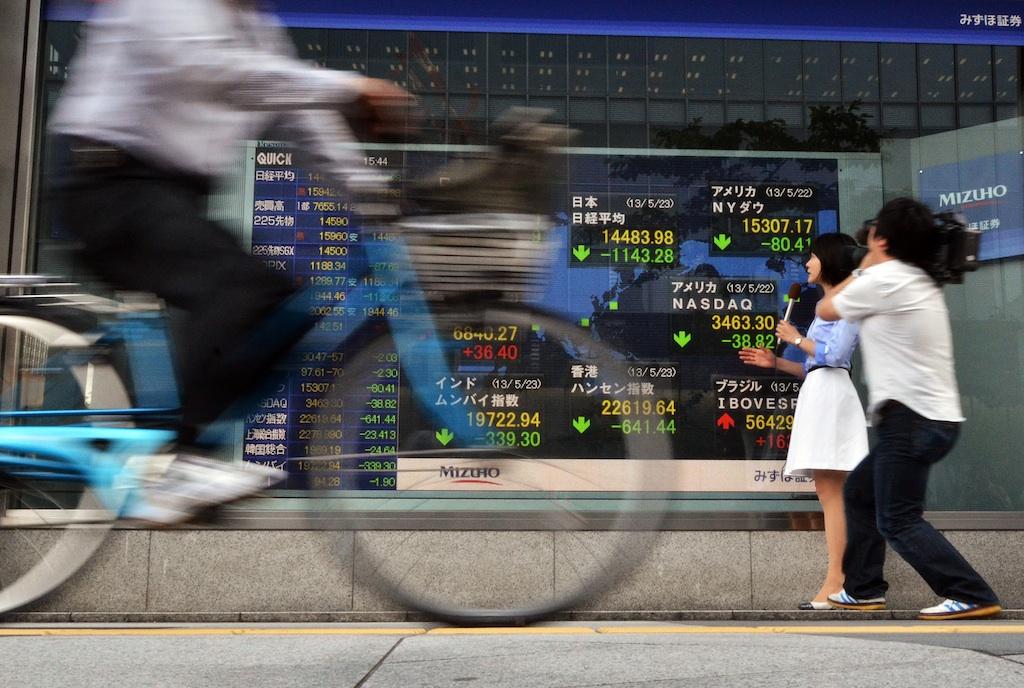Does Japanese market volatility signal the end of Abenomics?
A television journalist reports on the sharp fall in Japanese stocks on May 23, 2013.
Does Thursday’s temporary 7.3 percent plunge in Japanese stocks spell the end to Abenomics?
Unlikely.
Since Prime Minister Shinzo Abe was swept to power in December on a promise to defeat deflation and revive the world’s third-largest economy, the benchmark Nikkei 225 has soared 50 percent.
Thursday’s fall, though the biggest since the aftermath of the Fukushima nuclear disaster more than two years ago, merely takes the market back to where it was about 10 days ago.
"Everyone is upset because stocks fell by 1,000 points, but current levels are much higher than those seen several months ago," Yoshio Kono, chief executive of Norinchukin Bank, told the Wall Street Journal.
"We don't think it's a sign that the government's economic plan is out of order."
Certainly, Japanese officials are showing no outward sign of concern.
“It's a temporary adjustment after the rapid gains seen recently," Yasutoshi Nishimura, senior vice-minister of the Cabinet Office, told Reuters.
Japanese Economy Minister Akira Amari said Thursday "there is no need for panic."
The fall was "not exceedingly large, and stock prices in China, where the shock originated, have not fallen so much either,” Amari was quoted by The New York Times as saying.
Abe’s plan to breathe life into the Japanese dormant economy relies on the Bank of Japan’s massive asset-buying program to create inflation and an increase in government spending.
The measures have boosted confidence in the economy — which expanded 0.9 percent in the first quarter — drawing international investors to the country’s stock market.
What Thursday’s volatility does mean is that Abe is not a magician — his economic policies can't make market volatility disappear.
It is normal for markets to go up and down. Investors are humans and they react to news — good and bad. When there is a confluence of events, like on Wednesday and Thursday, they sometimes react violently.
HSBC released data on Thursday showing factory output in China, the world’s second largest economy and a key buyer of Japanese exports, contracted in May for the first time in seven months.
That came after Fed Chairman Ben Bernanke's unnerving, not to mention confusing, testimony to Congress on Wednesday.
Bernanke said the Fed could soon start to “step down” bond purchases while warning that applying the brakes to the stimulus program too early could endanger the US economic recovery. His comments left investors scratching their heads and many rushed for the exits.
“Are we going to trade lower? I think we are,” Paul Krake, founder of Hong Kong-based consultancy View from the Park, told the Financial Times. “But I’m sticking to my guns. We’re seeing structural, generational changes in Japan.”
More from GlobalPost: What was behind plunge in Japanese stocks, which triggered falls across global markets?
The story you just read is accessible and free to all because thousands of listeners and readers contribute to our nonprofit newsroom. We go deep to bring you the human-centered international reporting that you know you can trust. To do this work and to do it well, we rely on the support of our listeners. If you appreciated our coverage this year, if there was a story that made you pause or a song that moved you, would you consider making a gift to sustain our work through 2024 and beyond?
